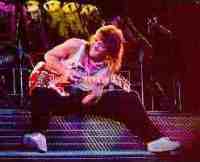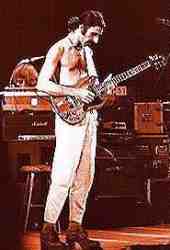
a
world without heroesGuitar heroes, that
is, is a world not worth living. But let's face it, the
days of Edward Van Halen, Randy Rhodes, Andres Segovia,
Jimi Hendrix, Stevie Ray Vaughn and their kind are over.
Today there are no stars in the guitar sky; no one is
getting people excited about playing guitar today. This
is especially sad for young people. In the past, the
thought of being able to play what Eddie does was enough
to fortify a serious commitment to practice, practice,
practice. Nowadays, nobody seems to care.
 What happened?
While many may point the finger at the dreaded
synthesizer and MIDI equipment, that explanation simply
does not hold water. What happened?
While many may point the finger at the dreaded
synthesizer and MIDI equipment, that explanation simply
does not hold water.
Guitar
meanwhile, cannot be adequately sampled due to the
complexity of attack and decay sounds produced by the
pick and the pickups. Keyboards could never replace
guitars. And they never did. There are plenty of guitar
bands out there, just no guitarists in the classic sense.
To
understand what really happened, we must look back at the
progression of the final guitar heroes. We can
essentially assign blame to three things.
1.
Overemphasis on heroism
2. Overemphasis on technique
3. Reaction to this
The first
is what could be called "misguided heroism".
Many young guitarists wanted so badly to be the next
guitar hero that they (sometimes literally) locked
themselves in their rooms and practiced until their
fingers no longer responded. While this did produce a
bumper crop of "hot" guitarists, there was
something missing, though no one seemed to be able to put
a finger on it. It comes into better focus, however, when
we consider Edward Van Halen.
Edward was
innovative. Yet even when he played non-innovative
things, there was excitement. Then Van Halen and David
Lee Roth split up. Now you tell me, has Edward's playing
lost something? Listen and compare. Surely he hasn't
regressed as a musician, however the content of the
heroism is gone.
Click the Van Halen logo to hear a sample of
"Eruption"

[requires Real Audio]
The songs were exciting then, but now they
fall flat. How often do you hear a great guitar solo in a
mediocre song? And if you do, how exciting is it? Along
with this, think of the other guitar heroes of old. Their
entire musical output was exciting - they weren't just
making a song to support a guitar solo!
Unfortunately this is just what many more
recent attempts at guitar heroism have fallen into. They
failed to realized that their guitar heroes did more than
just play the guitar - they wrote quality music, or in
the case of Segovia, played great music written by
others.
 The second problem
is closely related. When they locked themselves in their
rooms, what did they practice? Did they play their blues
and rock albums over and over again and jam with them
like their heroes did? The second problem
is closely related. When they locked themselves in their
rooms, what did they practice? Did they play their blues
and rock albums over and over again and jam with them
like their heroes did?
Not many.
Most practiced scaled, arpeggios, technical exercises and
melodic studies. They seemed to view their musicianship
as building a bridge rather that as a river. Technical
formulas and rigid fingerwork replaced the fluid power of
spontaneous, natural, musical response. What came out was
a group of incredibly impressive, tight, smoking
axe-wielders. They each had their fifteen minutes of
fame; perhaps Malmsteen had a half hour, but this was
mostly in the eyes and ears of fellow guitarists. Regular
people were impressed but not moved. Struggling so hard
to be impressive, these hot shots ceased to be
expressive. Their music is all but forgotten.
The third
reason is a reaction to the second. Disgusted with the
soulless, bland, non-musical generation of technique
freaks, the next generation of guitarists reacted by
abandoning the quest for musicianship altogether.
 Even those moderns who are accomplished at
the instrument don't show it for fear it may detract from
their integrity in presenting a pure musical message.
While this may be honorable, it has its price. Noteworthy
in this area is Kurt Cobain, whose MTV Unplugged
performance revealed he barely knows how to use his
fingers. Yet Cobain's music lives on for it is music. He
and his contemporaries accomplished their mission, and
honest music made a temporary comeback (until the next
harvest of imitators is reaped) Unfortunately, the guitar
as an instrument to really play was sacrificed in the
process. Even those moderns who are accomplished at
the instrument don't show it for fear it may detract from
their integrity in presenting a pure musical message.
While this may be honorable, it has its price. Noteworthy
in this area is Kurt Cobain, whose MTV Unplugged
performance revealed he barely knows how to use his
fingers. Yet Cobain's music lives on for it is music. He
and his contemporaries accomplished their mission, and
honest music made a temporary comeback (until the next
harvest of imitators is reaped) Unfortunately, the guitar
as an instrument to really play was sacrificed in the
process.
We have
almost come full circle. Bands that speak their hearts
and minds are attracting the attention of a new audience,
just as in the '60's. The musicianship is often raw, but
the ideas come through. The inescapable truth is ready to
be rediscovered. That your music comes through more
powerfully when you play it well. We have learned the
lesson that the music is far more important than the
playing. The music industry itself has learned that
lasting value does not come from being impressive.
Musicians may like to be impressed, but people want to be
reached, to be moved.
The
mission of the Maestro is to bring the emphasis back to
the music while still fostering the value of great
musicianship. The field is WIDE OPEN for a new generation
of guitar heroes who still have their priorities
straight.
You may be
one of them......

|